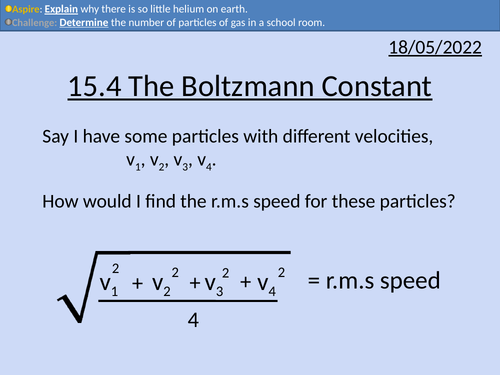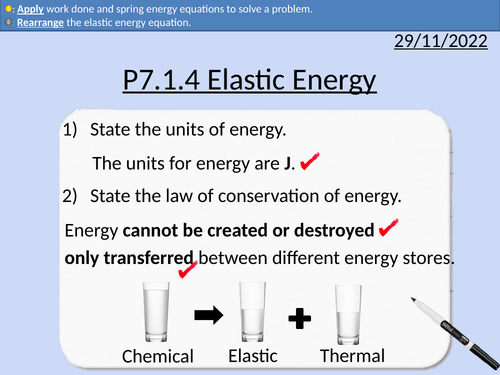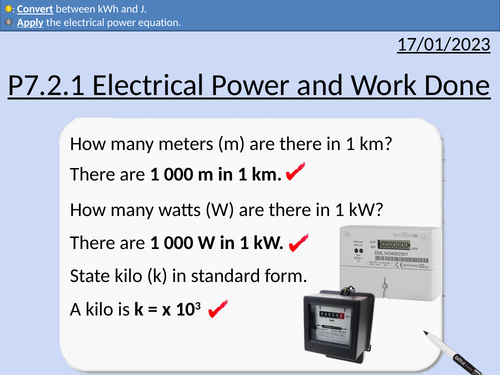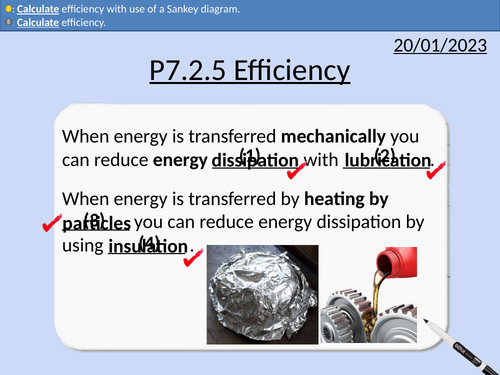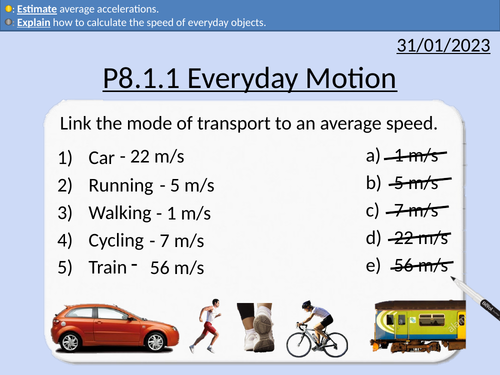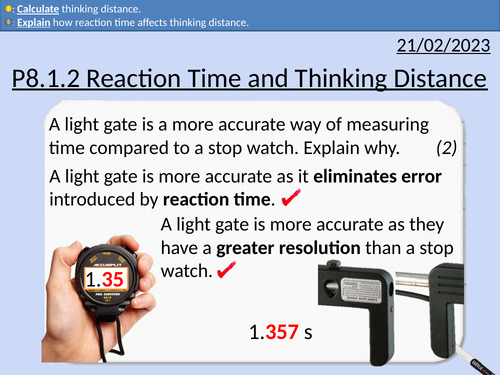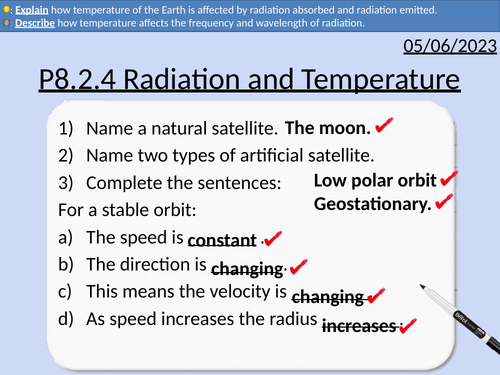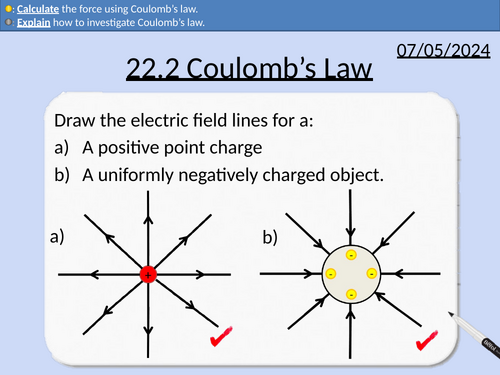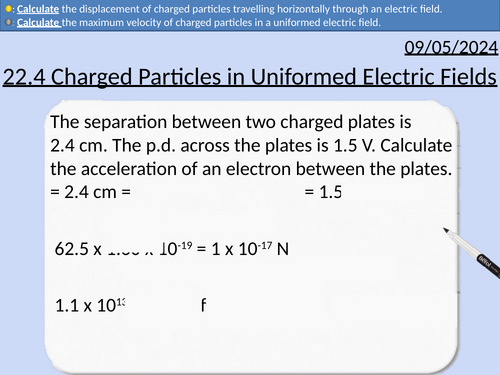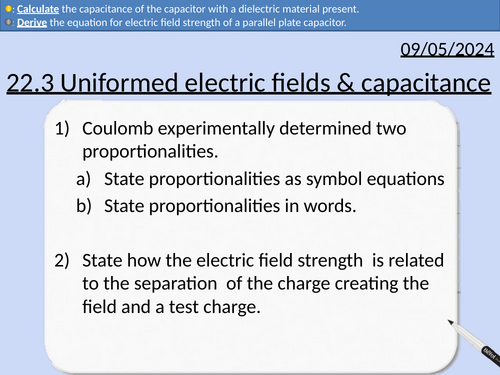496Uploads
163k+Views
70k+Downloads
Physics

GCSE Physics: Pressure and Volume
This presentation includes:
Pressure x Volume = Constant
Worked Examples
Plotting of pressure-volume graph
Explanation of increasing energy and temperature with bike pump

OCR A level Physics: Solids, Liquids and Gases
OCR A level Physics: Solids, Liquids and Gases is a part of the Module 5: Newtonian World and Astrophysics. The PowerPoint presentation includes worked examples, solutions and a homework.

OCR A Level Physics: The Boltzmann constant
OCR A Level Physics: The Boltzmann constant presentation with homework and answers

GCSE Physics: Work Done and Elastic Energy
This presentation covers OCR Gateway Physics 9-1 P7.1.4 Work Done and Spring Energy.
Use of Springs
Measuring Extension of a Spring
Rearranging Spring Energy Equation
Rearranging Kinetic Energy Equation
Practice Questions with Worked Solutions

GCSE Physics: Electrical Power and Work Done
This presentation covers OCR Gateway Physics 9-1 P7.2.1 Electrical Power and Work Done. All presentations come with student activities and worked solutions.
Definition of power
Converting between W and kW
Converting between seconds, minutes, and hours
Calculating work done in kWh and J
Converting between kWh and J

GCSE Physics: Efficiency
This presentation covers OCR Gateway Physics 9-1 P7.2.5 Efficiency.
All presentations come with student activities and worked solutions.
Efficiency Ratings
Improving efficiency with insulation and lubrication
Maximum efficiency
Efficiency equation
Sankey diagrams

GCSE Physics: Everyday Motion
This presentation covers OCR Gateway Physics 9-1 P8.1.1 Everyday Motion. All presentations come with student activities and worked solutions.
Average speeds of walking, running, cycling, cars, trains, wind, sound, and light.
The speed equation
The acceleration equation
Explaining average speed camera
Explaining instantaneous speed camera
Estimating everyday accelerations
Calculating speed from rotation speed and circumference of wheels
Converting from miles per hour to meters per second

GCSE Physics: Reaction Time and Thinking Distance
This presentation covers OCR Gateway Physics 9-1 P8.1.2 Reaction Time and Thinking Distance. All presentations come with student activities and worked solutions.
Reaction time definition
Factors that increase reaction time
Simple reaction time experiment
Thinking distance
Rearranging equations
Speed equation
(Final velocity)2 – (Initial velocity)2 = 2 x Acceleration x Distance
v2 – u2 = 2 a s

GCSE Physics: Forces in Collisions
This presentation covers OCR Gateway Physics 9-1 P8.1.4 Forces in Collisions. All presentations come with student activities and worked solutions.
Large accelerations produce large forces.
Values of g that cause severe injury or death
Road Safety
Newton’s First Law and seat belts
Crumple zones
Force = Mass x Acceleration
Acceleration = Change in velocity /Time taken
Estimating speed, accelerations and forces involved in large accelerations for everyday road transport.

GCSE Physics: Radiation and Temperature
This presentation covers OCR Gateway Physics 9-1 P8.3.4 Radiation and Temperature
This PowerPoint is a whole lessons included with student activities and animated answers.
All objects emit electromagnetic radiation
Describe how changing temperature changes frequency, wavelength, and intensity of the radiation produced.
Explain why objects change temperature by absorbing and emitting radiation.
Explain why the temperature of the Earth changes due to greenhouse gases in the atmosphere.
Bundle

GCSE OCR Physics: P2.3 Forces in action
All resources for P2.3 GCSE OCR Physics Gateway 9-1.Triple and comined (Higher and Foundation) is covered in this material.
Includes:
• Stretching springs
• Stretching materials and storing energy
• Gravitational Fields and Potential Energy
• Turning Forces
• Simple Machines
• Hydraulics

GCSE Physics: Electrical Current Practical Activity
This presentation covers OCR Gateway Physics 9-1 P3.1.2 Electrical Current
Electron flow and conventional current
Measuring current with ammeters
Series and parallel circuits
Comparing current at junctions

OCR A level Physics: Coulomb’s Law
OCR A level Physics: 22.2 Coulomb’s Law
Module 6 Particles and Medical Physics
This PowerPoint is a whole lesson included with student activities, animated answers, homework questions with answers provided.
This lesson covers:
Electric force related to the product of charge and square of the separation
The constant of proportionality 𝑘
Permittivity of free space
Experiment for investigating Coulomb’s Law
Electric Field Strength and Coulomb’s Law

OCR A level Physics: Charged particles in uniformed electric fields
OCR A level Physics: 22.4 Charged particles in uniformed electric fields
Module 6 Particles and Medical Physics
This PowerPoint is a whole lesson included with student activities, animated answers, homework questions with answers provided.
This lesson covers:
Equations for constant acceleration
Maximum kinetic energy of a charged particle in a uniformed field
Sketching trajectories for charged particles in uniformed fields
Calculating velocities for horizontal and vertical components

OCR A level Physics: Uniformed electric fields & capacitance
OCR A level Physics: 22.3 Uniformed electric fields & capacitance
Module 6 Particles and Medical Physics
This PowerPoint is a whole lesson included with student activities, animated answers, homework questions with answers provided.
This lesson covers:
Liquid crystal displays (LCDs)
Electric field between two charged parallel plates
Deriving an equation for electric field strength of a parallel plate capacitor.
Accelerating charged particles in a uniformed electric field
Capacitance of a parallel plate capacitor with an insulating (dielectric) material - relative permittivity
Millikan’s experiment

OCR A level Physics: Charged Particles in Magnetic Fields
OCR A level Physics: 23.3 Charged Particles in Magnetic Fields
Module 6 Particles and Medical Physics
This PowerPoint is a whole lesson included with student activities, animated answers, homework questions with answers provided.
This lesson covers:
Apply Fleming’s left-hand rule to charged particles
Deriving an equation for the magnetic force experienced by a single charged particle (F = BQv)
Charged particles describing (moving) in circular paths in magnetic fields.
The velocity selector.
The Hall probe and Hall voltage.

OCR A level Physics: Electromagnetic Induction
OCR A level Physics: 23.4 Electromagnetic Induction
Module 6 Particles and Medical Physics
This PowerPoint is a whole lesson included with student activities, animated answers, homework questions with answers provided.
This lesson covers:
Electromagnetic induction produces an induced e.m.f
Conditions to produce electromagnetic induction
How to increase electromagnetic induction
Magnetic flux density, magnetic flux, and magnetic flux linkage
Units of weber (Wb)

OCR A level Physics: Transformers
OCR A level Physics: 23.6 Transformers
Module 6 Particles and Medical Physics
This PowerPoint is a whole lesson included with student activities, animated answers, homework questions with answers provided.
This lesson covers:
Structure of transformers
Step-up and step-down transformers
The turn-ratio equation
The ideal transformer equation
Why transformers are used in the National Grid

OCR A level Physics: Nuclear decay equations
OCR A level Physics: 25.2 Nuclear decay equations
Module 6 Particles and Medical Physics
This PowerPoint is a whole lesson included with student activities, animated answers, homework questions with answers provided.
This lesson covers:
Typical speeds of radiation produced form nuclear decays
Conservation rules for nuclear decays
Nuclear notation
Alpha decays
Beta-minus and beat-plus decays
Gamma decays
Decay chains

Physics Display - Science Jobs/Women in Physics
Several word documents with content concerning women in physics and jobs in physics. These displays are in line with IoP recommendations to promote women in physics.



